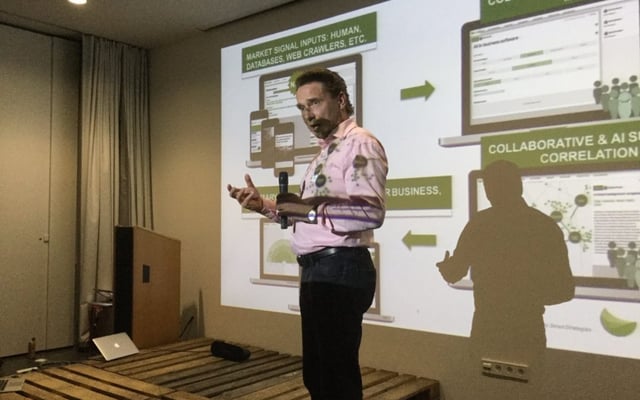Confessions of a CEO: Changing lanes to accelerate foresight with AI

I promised I’ll share my experiences on how it feels like to be part of an international startup accelerator program, and to be on our journey towards ‘hybrid foresight’ and ‘smart strategies’. Call it “Confessions of a CEO’.
What I want to discuss here firstly is how we ended up on this path, and secondly what it means for a small company such as ourselves.
Our background shortly
I started Necorpoint as a purebred management consulting company, with a desire to help our customers to better run, or even to transform their businesses. Our offering immediately consisted of market foresight and strategic management services. We aimed at providing continuous services for our customers, not just one-timer-workshops, with our tail lights flashing after the work was done.
Long story short; we saw that futures thinking and a novel way of discovering new opportunities were the capabilities many companies were seeking. Age-old-questions were present: how to do it, how to do it effectively, how to connect the new opportunities with strategic management. We had a perfect service for it, and it truly served these needs.

Strategic steps
So, there seemed to be a market for continuous market foresight services. After a while, we noticed that two major things were hindering our progress: 1) our business scalability, and 2) our customers' fear of investing their own time into such work. So, a decision was taken that is pushing us from a service company to a software as a service company. A big decision for us, but we believe both of the above problems can then be solved.
The first version of our software went live in spring 2016. Now a year later, we are taking another leap by aiming to support our customers' strategic decision making with the help of artificial intelligence.
And what of AI? Why do we believe in this?
Artificial intelligence and machine learning in their many forms are here to stay. Giants like Amazon, Google and IBM are without a doubt forerunners and main creators of the ecosystems around them.
As for us, we are not here to build the new algorithms, nor to create new technology. Our aim is to apply the best technologies at high usability, all in order to help our customers make educated and insightful decisions about their future. In practical terms, we are providing capabilities for handling large amounts of textual data from different sources, for finding correlations between them, and for highlighting clusters of information that might show directions for emerging or changing phenomena and trends.
AI can help in discovering new paths, or being aware of what to avoid. All this might not suit everyone's pallet just yet, but keep an eye on the fore-runners on the field. There will be a tidal wave of business applications for answering different problems (the Forbes article shows some examples of the areas). And foresight, trend management, and innovation management have a lot to gain here!
A few takeaways
Hope you find this helpful when thinking of your strategic direction, this is what we did:
1. Know your market and gather insight of where it is heading. Since we've been running our own market foresight services for years, we naturally kept our fingers on the pulse of what was happening in the market. We even had a few options to choose from. The simplest and cruelest judge for making sure you are seeing the opportunity correctly, and for selecting between your options, is money: will someone buy this new thing?
2. Know your capabilities. Our other questions circled around our own capabilities, the resources and the potential markets. We also had help from Tekes (the Finnish Funding Agency for Innovation) in the start, helping us scan and learn the opportunities in the international markets.
3. Be bold. Especially if you are a small company or a startup, even drastic moves can come easier. Sometimes the timing plays a factor...sometimes just being in the right place, at the right time with the right people. We ended up applying for Startup Autobahn and got accepted. This is an amazing opportunity to connect with companies and people that would have been very difficult to get to talk to otherwise. Startup accelerators can also provide a lot of knowledge sharing and of course, it is a place to test and pilot your products if needed. We just had our first 'focus week' in Stuttgart, and the next one is in April. So far things are looking very exciting indeed.
And finally...I know how scary it can be to push your own product or service to the market, bringing out that first minimum viable version. As long as it serves the core purpose - it'll work. Trust me. :)

Panu Kause is the founder and CEO at FIBRES. Before founding FIBRES, he held several management positions and ran his own foresight and strategy focused consultancy.
Stay in the loop
Get our latest foresight tips delivered straight to your inbox. You may unsubscribe from these communications at any time.